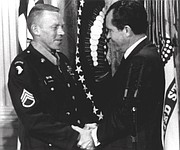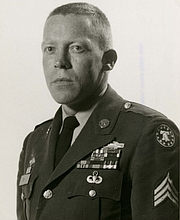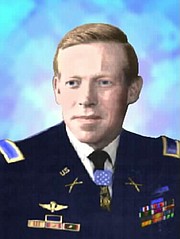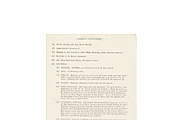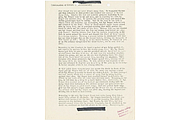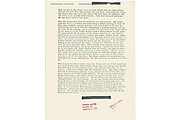Moses Lake's American Legion Post namesake was one of the most decorated soldiers in history
It was the morning of Feb. 21, 1968, near Hue, Vietnam. An army company known by its members as the Delta Raiders was assaulting a heavily-defended position along a river bank when it was met by withering fire from rockets and machine guns. The North Vietnamese had dug into the surrounding terrain, laying down bunker after bunker with which they could flank the approaching American forces.
Staff Sergeant Joe R. Hooper rallied five men and raced across the river, immediately overrunning five bunkers on the opposite shore. Joe rushed to the aid of a wounded man, evacuated him, and then returned to the fray. He rushed to evacuate another wounded soldier, only to be wounded himself by grenade fragments. He was then ordered to remain at the back for treatment and evacuation of his own. He refused, and again he returned to the front line.
Hooper's actions over the coming hours were those of a Hollywood director's fever dream: running into enemy fire to save man after man; seizing anti-tank weapons to demolish buildings that hid snipers; running along bunker after bunker and destroying them with grenades; killing those who threatened him or his fellow soldiers with rifle, pistol and bayonet.
At the end of the day, Joe had destroyed 11 enemy bunkers, three buildings that hid the enemy, and had directly saved the lives of at least five men. In the process, a gunshot wound and more grenade fragments compounded his wounds, but he refused treatment or evacuation until the enemy was destroyed and his men were reorganized.
“It is difficult to adequately praise Sgt. Hooper for his actions on this day,” wrote Lee Grimsley in a contemporary account. “He destroyed more enemy positions and killed more enemy soldiers by himself than some companies claimed at the end of the day.”
For his actions during that single conflict, Joe R. Hooper was awarded the United States' highest military honor, the Medal of Honor.
To become such a man
Born Joe Ronnie Hooper in 1938, he spent his first ten years in Piedmont, S.C., before moving to Moses Lake in 1948, where he would go to both grade and high school. A tall kid, Joe excelled at high school track and football, winning numerous awards for his athletic prowess despite not finishing out his senior year. Instead, Joe promptly join the Navy in '56 for three years, getting his GED in 1959 when he left for a brief period.
Joe worked a number of manufacturing jobs for the next year, before deciding to return to active duty. As the story goes, the Navy recruiter was out to lunch when Joe came down to the recruiting office, and that was why he decided to join the Army.
Joe served eight years during his first stint with the Army and was stationed first in Korea, then in Panama for a few years before finding himself in the jungles of Vietnam. He was honorably discharged in 1968, having earned the Medal of Honor and numerous other accolades, only to re-enlist the next year and be re-deployed to Vietnam. Though Joe's most famous acts of gallantry were on display during the Tet Offensive of '68, it was not the last his peers and superiors would see of Joe's conspicuous bravery. Serving as a patrol leader only a month later in an ambush northwest of Hue, two of his men were wounded by enemy gunfire.
“With utter disregard for his own life, he maintained his position firing magazine after magazine into the awesome hostile force, ignoring the lethal rounds hitting all around him,” a military citation reads, stating that Joe continued to fire until his men were all rescued. For his actions that day, Joe was awarded the Silver Star, one of two he would eventually earn.
At one point or another, Joe would earn dozens of medals and awards for his actions in the field of battle, including two Silver Stars with Oak Leaf Clusters, six Bronze Stars with “V” Device and Oak Leaf Clusters, and eight Purple Hearts, and countless others. All told, Hooper would end his military career with 37 medals, becoming one of the most highly decorated soldiers not just of the Vietnam war, but of American military history. He earned more medals even than World War II's Audie Murphy, who had become a good friend of Hooper's after the two met at a Medal of Honor Convention. When Murphy died in 1971, Hooper served as one of his pallbearers.
The apple of his eye
Shortly after earning his Medal of Honor, Joe came across his future bride, Faye, who was a model at the time.
“Two soldiers came in and sat down, and when the models came down the runway they whistled and stomped their feet and acted like heathens,” Faye said wryly. “I knew that Uncle Sam had an animal program of some kind, I just thought he kept them in cages.”
Joe asked Faye out to dinner that night, which Faye declined. The next night, Joe came again, this time with a dozen yellow roses, and asked Faye to marry him. Though she again declined, he persisted. Soon after, President Nixon gave Joe special permission to redeploy to Vietnam, and he asked Faye to write him. She agreed, but only as friends.
Three years later, Faye and Joe were married.
“Joe was just different,” Faye said. “I never thought I'd get married, I fully intended not to marry.”
Faye described her late husband as neat, kind and romantic — an overall lovable man when he wasn't being crazy, Faye said.
In the echo of the war
Joe's impulse to help others despite the danger didn't end with military service, when time after time he faced enemy gunfire in order to drag a wounded comrade to safety: Faye recalled one drive along a California highway, when the Hoopers passed by a sports car that had rolled over and was spewing smoke.
Fire officials warned that the vehicle was ready to blow at any minute, telling those who had gathered to stay back. Ignoring their warnings, Joe rushed to the aid of the driver trapped inside the car and pulled him out, before the car caught on fire and was engulfed in flames.
Less adrenaline-inducing was Joe's work volunteering among the community, including 16 history lectures at various high schools across the country, hosting Boy Scout Jamborees and inspiring troubled children with the Big Brothers of Los Angeles, all of which was praised by military officials and event organizers. Never one to forget his roots, Joe was the Grand Parade Marshal for the 1969 Grant County Fair.
Though he often inspired feelings of patriotism in the children he was supervising, Joe didn't talk much about the war, Faye said. Instead, he came up with ways to avoid painting himself as a hero.
People would often push Joe to tell the story of the conflict that had earned him the Medal of Honor, Faye said, and Joe would regularly say that a detachment had gone to a nearby village to stock up on beer for a party when Viet Cong ambushed Joe and his men.
“‘So of course we had to rip them and come on through to our party,'” Faye recalled Joe as saying. “That was always his story.”
Joe simply wanted to leave the war behind, Faye said, and she describes a man not comfortable with fame.
“He always said you're not awarded the Medal by yourself; you have a lot of other people helping you,” Faye said. “It's really a group effort, even though they single out one person. He was just doing his job.”
Rather, Joe took more joy in celebrating the heroics and sacrifices of others than his own. The Queen of Holland invited the Hoopers to the Netherlands to commemorate the unveiling of a memorial to Joe Mann, a World War II-era Medal of Honor recipient famous internationally for throwing himself on a grenade to save his brothers in arms and famous within the Netherlands for delivering candy bars to starving children.
The night before the statue was unveiled, Joe told Faye he was going out for short stroll but did not return for quite some time. It wasn't until the next morning during Mann's memorial service that Faye and the Dutch people discovered what Joe had snuck out the night before to do.
The statue was a towering piece crowned by a large pelican, and as the Queen and gathered assemblage looked upwards towards the newly unveiled memorial, they saw Hooper's Medal of Honor wrapped around the neck of the pelican.
Faye said that Queen Juliana turned to Joe and proclaimed that his gift would be cherished forever by the country. Joe, who had placed the Medal more as a gesture than as a permanent gift, looked at his wife with shock.
“Joe looks at me and says, ‘you go tell her she can't take the medal, I can't give it away,'” Faye said. “I said, I'm not accustomed to telling a Queen anything.”
A legend's end
It was the Hoopers' second trip to the Kentucky Derby, and they had brought along their three-year-old daughter Joey, who had a fondness for horses. A number of soldiers recognized Joe, and Faye, seeing that they were striking up a conversation, told Joe she would take Joey back to the hotel and that they would see him later.
It was the last time Faye would see Joe alive. At 40, Joe died from a cerebral hemorrhage.
Rumors have persisted over decades that Hooper was depressed by the anti-war sentiment that shadowed Vietnam veterans and he subsequently drowned his sorrows with alcohol, which is said to have contributed to his untimely death.
In a Seattle Weekly article from 2004, friends of Hooper's recounted stories of a man haunted by an ungrateful nation, not necessarily ungrateful for himself so much as the men who were not wreathed in medals, who weren't invited to castles and capitols, who weren't able to come home from the jungle. In 1969, Joe gave a lecture at the Fullerton Elk Lodge entitled, “Our Flag, Love It Or Leave It,” according to his personnel file, signifying a mounting distaste for those whose patriotism often waned.
For her part, Faye Hooper said that writers have sullied Joe's good name in the interest of a compelling story. Joe was a man in good health whose compassion for others was not diminished by time or tribulation, Faye said, and while he may have drunk with his men, he never drank near his wife and children. For Faye, Joe's death was an unmitigated shock.
Whether or not he struggled with alcohol himself, many returning from Vietnam did suffer from substance-abuse issues, and the Veterans Affairs administration was largely unequipped to properly treat various forms of trauma or addiction.
Today, Joe's name graces the substance abuse wing of the Seattle Veterans' Medical Center as well as Moses Lake's American Legion post. Whether he suffered from addiction or not, Joe's legacy continues to be that of a man who saves those in need.










